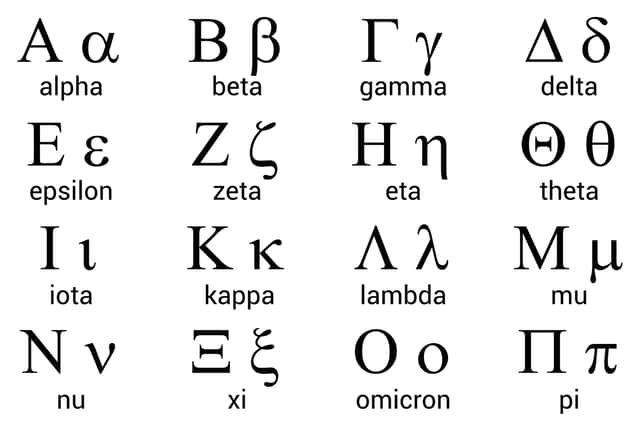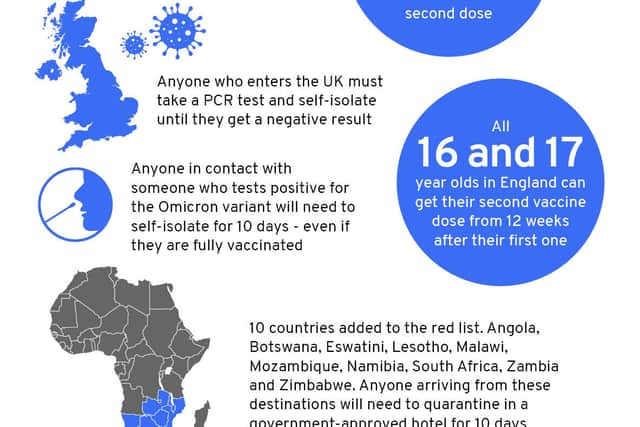How was Covid Omicron variant named? Meaning of Greek alphabet letter explained - and why epsilon was ‘missed’
This article contains affiliate links. We may earn a small commission on items purchased through this article, but that does not affect our editorial judgement.
and live on Freeview channel 276
The Omicron Covid variant has caused record numbers of daily cases in the UK over the past few weeks.
But the UK Government has avoided bringing in stricter restrictions to control the spread of the latest strain in England, despite the devolved administrations in Wales, Scotland and Northern Ireland all bringing back tougher measures.
Advertisement
Hide AdAdvertisement
Hide AdPrime Minister Boris Johnson’s administration has argued that Omicron has not been overwhelming the NHS and that the Covid-19 vaccination and booster jab programme means tighter curbs on public freedoms are unnecessary.
The latest Covid variant’s name has also brought Omicron - a previously obscure letter from the Greek alphabet - to the public’s attention.
So, what does Omicron mean, why was it chosen over Epsilon - and how do you pronounce it?
Here’s everything you need to know.


What is Omicron?
Omicron is the 15th letter of the Greek alphabet.
Unlike some of the other Greek letters, it’s recognisible in modern English as it takes the form of the letter ‘O’.
Advertisement
Hide AdAdvertisement
Hide Ad

However, Omicron does not roll off the tongue as easily as other Covid variants, like Beta and Delta, because it contains three syllables.
It is pronounced ‘Om (like home but without the ‘h’) - eh - cron’.
Why has Omicron been chosen as the name of the new Covid variant?
Omicron was officially chosen to be the name of the latest Covid variant by the World Health Organisation (WHO) on 26 November.
The strain, originally known by the slightly less catchy moniker B.1.1.529, has been designated as a ‘variant of concern’ by WHO.
Advertisement
Hide AdAdvertisement
Hide AdThis designation means scientists are concerned about the degree to which the virus has mutated.


By choosing Omicron as the latest variant’s name, the WHO has skipped two letters of the Greek alphabet - ‘Nu’ and ‘Xi’.
According to Associated Press (AP), the UN organisation said it had not gone for ‘Nu’ because it was worried people would mix it up with ‘new’.
‘Nu’ is also the word for ‘naked’ in French - although the WHO has not said this was an official reason for missing out the Greek letter.
Advertisement
Hide AdAdvertisement
Hide AdWHO said it had missed out ‘Xi’ because it is a “common last name” and it didn’t want to cause offence to anyone.
However, at the time the Omicron variant was given its name, it was pointed out that avoiding Xi might have had more to do with not upsetting President Xi of China.
Why is the variant not called ‘Epsilon’?
Given the Delta Covid variant was the previous dominant strain in the UK, many have wondered why the new variant was not called the next letter of the Greek alphabet - Epsilon - by the WHO.
While Delta was the previous ‘variant of concern’ before what is now Omicron, WHO has also been naming less serious ‘variants of interest’ after letters of the Greek alphabet.
Advertisement
Hide AdAdvertisement
Hide AdSome of these have only been found in small numbers in the UK.
For example, only several dozen cases of the previous named variant - ‘Mu’ - have been found in the UK since it was given its official designation in August 2021.
But the variant was not considered to be as deadly as Delta or Delta Plus.
What have people said about the new Covid variant’s name?
Twitter had a field day when Omicron was named.
Many pointed out that Omicron is an anagram of ‘moronic’, while others have enjoyed how sci-fi it sounds.
Here were some of the best reactions:
A message from the editor:
Advertisement
Hide AdAdvertisement
Hide AdThank you for reading. NationalWorld is a new national news brand, produced by a team of journalists, editors, video producers and designers who live and work across the UK. Find out more about who’s who in the team, and our editorial values. We want to start a community among our readers, so please follow us on Facebook, Twitter and Instagram, and keep the conversation going. You can also sign up to our email newsletters and get a curated selection of our best reads to your inbox every day.
Comment Guidelines
National World encourages reader discussion on our stories. User feedback, insights and back-and-forth exchanges add a rich layer of context to reporting. Please review our Community Guidelines before commenting.
